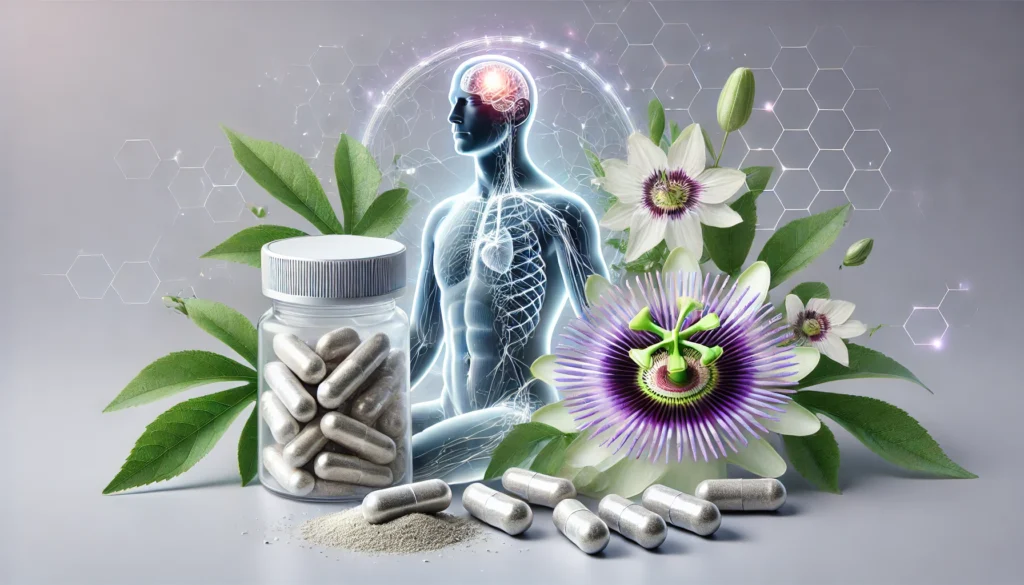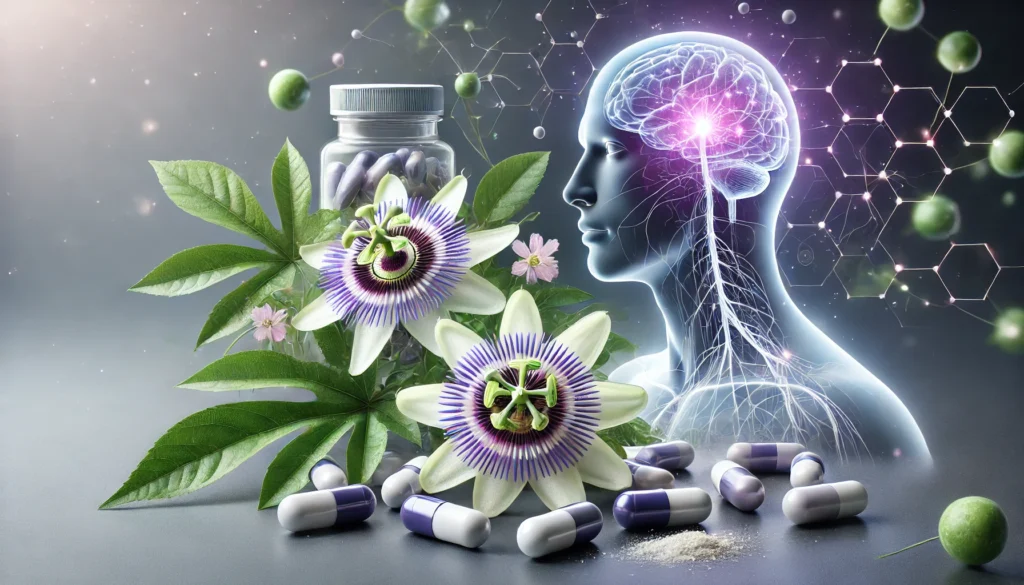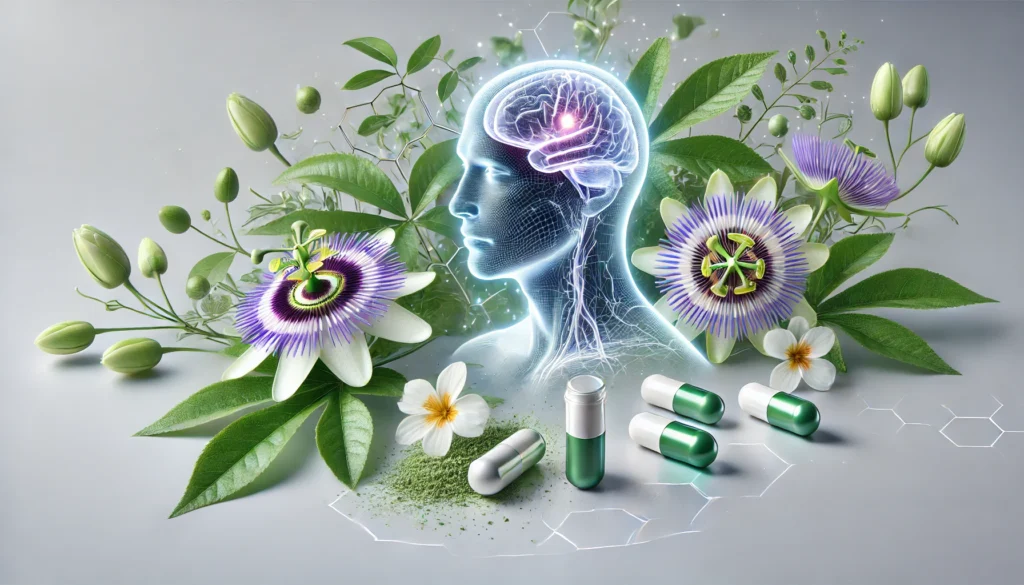For millennia, many nutritionists have used the passionflower plant for medical purposes. Due to its soothing properties, it is frequently used to treat insomnia and anxiety. Passionflower has been more well-known recently as a nootropic substance that can improve alertness, focus, and cognition. The nature of passionflower, its health advantages, the recommended dosage, possible negative side effects, drug interactions, and safe usage will all be covered in this article.
You May Also Like:
Ecdysterone: Benefits, Dosage, Side Effects, Drug Interactions, and Other Important Information
Agrimony: Benefits, Dosage, Side Effects, Drug Interactions, And Other Important Information
Nature of Passionflower
The perennial climbing vine known as passionflower, or passiflora incarnata, is indigenous to North and South America. Its name comes from the lovely, intricate flowers it produces that have a distinctive appearance. Traditional medicine has historically used the herb to treat a number of conditions, including anxiety, sleeplessness, convulsions, and pain alleviation. Passionflower is categorized as a nootropic because of its potential to improve cognition. The plant has various bio-active substances, including flavonoids, alkaloids, and glycosides, which are thought to be the source of its therapeutic effects. These substances have been demonstrated to offer a range of health benefits, including antioxidant, anti-inflammatory, anxiolytic, and sedative effects on the body and brain.
Health Benefits of Passionflower
There are many health advantages to passionflower, some of which are supported by research. A well-known advantage of passionflower is its ability to ease tension and encourage relaxation. According to a research in the Journal of Clinical Pharmacy and Therapeutics, passionflower extract can reduce anxiety just as well as benzodiazepines while avoiding their negative side effects.
Additionally, passionflower has shown the ability to enhance sleep quality. In individuals with insomnia, a research published in Phytotherapy Research indicated that passionflower extract significantly enhanced sleep quality. Another study indicated that passionflower extract enhanced the amount of slow-wave sleep, which is crucial for cognitive function and memory consolidation. This study was also published in the Journal of Sleep Research.
It has been established that passionflower possesses anti-inflammatory and antioxidant properties in addition to its sedative and anxiolytic effects. According to a study in the journal called Food Chemistry, passionflower extract exhibits strong antioxidant properties that can help defend against oxidative stress and inflammation. Passionflower extract demonstrated anti-inflammatory effects on mice, according to a different study that was published in the Journal of Ethnopharmacology.

Chemistry of Passionflower
Alkaloids, flavonoids, and glycosides are some of the bio-active substances found in passionflower. The bio-active components of passionflower that have received the most attention are:
- Harmala Alkaloids: The substances called harmane, harmaline, and harmine harmala alkaloids can be found in passionflower. The pharmacological activities of these substances are known to include sedative, anxiolytic, and antidepressant properties. The most prevalent alkaloid in passionflower, harmane, is what gives it its calming and anxiolytic effects.
- Flavonoids: Apigenin, luteolin, and quercetin are just a few of the flavonoids found in passionflower. These flavonoids contain anti-inflammatory and antioxidant effects that can help shield cells from free radical damage. The most potent flavonoid in passionflower, apigenin, is what gives it its anxiolytic effects.
- Glycosides: Vitexin and isovitexin are two of the glycosides found in passionflower. These substances can lessen muscle spasms and encourage relaxation due to their antispasmodic and sedative properties.
Together, the bio-active components in passionflower cause its therapeutic effects. For instance, harmane boosts GABA function, but flavonoids have anti-inflammatory and antioxidant characteristics.
Physiological Properties of Passionflower’s Effects on the Body and Brain
It is hypothesized that the bio-active components in passionflower are what give it its therapeutic benefits. These substances have a variety of impacts on the body and brain depending on how they interact with different receptors and neurotransmitters.
Flavonoids are one of the main constituents of passionflower. Strong antioxidants known as flavonoids can prevent cell deterioration brought on by free radicals. Additionally, they have anti-inflammatory properties that help lower inflammation throughout the body.
Harmane, an alkaloid also present in passionflower, has been demonstrated to have sedative and anxiolytic properties. GABA is a neurotransmitter that suppresses brain activity and encourages relaxation. Harmane works by boosting GABA activity.
Several glycosides found in passionflower have also been proven to have calming and antispasmodic properties. Glycosides function by preventing neurotransmitters like acetylcholine from being absorbed into cells, which can lessen muscular spasms and encourage relaxation.

Optimal Dosage of Passionflower
The ideal passionflower dosage is influenced by a number of variables, including age, weight, and general health. Although there is no established dosage for passionflower, most research have used daily doses between 250 and 1,000 mg. To prevent any potential side effects, it is crucial to begin with a low dose and then gradually raise it.
There are several ways to consume passionflower, including tinctures, teas, gummies, and tablets. It is crucial to administer medication according to the manufacturer’s dose and administration guidelines. Before taking any new supplement, it is also advisable to speak with a doctor, especially if you have any underlying medical issues or are already taking medication.
Side Effects of Passionflower
When taken as recommended, passionflower is usually regarded as secure. However, it can have side effects in some individuals, just like any supplement. Drowsiness, dizziness, and disorientation are some of the most frequent side effects of passionflower. Higher doses or when mixed with other sedatives or alcohol increase the likelihood of these negative effects happening.
Additionally, passionflower can interact with other medicines, such as benzodiazepines, antipsychotics, and antidepressants. If you are taking any medicine, it is crucial to speak with a healthcare provider before using passionflower.
Potential Substance Interactions with Passionflower
Alcohol and sedatives are two drugs that can interact with passionflower. While taking passionflower, it is vital to avoid drinking alcohol or using other sedatives because they might intensify the supplement’s sedative effects and lead to excessive sleepiness, dizziness, and confusion.
Medications that influence the central nervous system, such as benzodiazepines and antidepressants, can also interact with passionflower. Additionally, these drugs can potentially intensify the sedative effects of passionflower and can have unfavorable side effects like respiratory depression and coma.
Before taking passionflower, it is crucial to speak with a doctor, especially if you’re on any medications or have any underlying medical issues.
Best Responsible Use of Passionflower
Passionflower can be a safe and effective natural nootropic supplement when used responsibly. It is important to consult with a healthcare professional before taking any new supplement, especially if you are pregnant, nursing, or have any underlying medical conditions.
When starting to take passionflower, it is recommended to start with a low dose and gradually increase it as needed. The optimal dose of passionflower varies depending on several factors, including age, weight, and health status.
It is important to only take passionflower as directed by the manufacturer or healthcare professional. Taking more than the recommended dose of passionflower can increase the risk of side effects, such as dizziness, nausea, or allergic reactions.
Monitoring your body’s response to passionflower is important. If you experience any adverse effects, such as dizziness, nausea, or allergic reactions, stop taking it immediately and consult with a healthcare professional.
In summary, the best responsible use of passionflower involves consulting with a healthcare professional, starting with a low dose, only taking as directed, not exceeding the recommended dose, and monitoring your body’s response to the supplement.
Passionflower: Conclusion
Passionflower (scientifically known as passiflora incarnata) is a climbing vine adorned with delicate white and purple flowers. Its chemical constituents have calming effects, making it a popular choice for various health purposes. Native to the southeastern United States, Central, and South America, passionflower has a rich history of traditional use, particularly in aiding sleep. Nutritionists and those alike have been able to turn to passionflower for anxiety management, including pre-surgery anxiety.
Some studies suggest that it may be as effective as certain prescription medications for anxiety relief. However, scientific evidence remains inconclusive for other potential uses. Passionflower is also added to foods and beverages for flavoring. While generally safe, it may cause drowsiness, dizziness, and confusion when consumed orally. As with any supplement, it is essential to consult a healthcare provider before use, especially during pregnancy or breastfeeding. Passionflower’s soothing properties continue to intrigue researchers, making it a fascinating botanical ally in the realm of wellness.

References:
- Passionflower in the treatment of generalized anxiety: a pilot double-blind randomized controlled trial with oxazepam. Link:
https://onlinelibrary.wiley.com/doi/full/10.1046/j.1365-2710.2001.00363.x
- ethnopharmacology, clinical application, safety and evaluation of clinical trials. Link: https://www.sciencedirect.com/topics/medicine-and-dentistry/passiflora-incarnata
- A double-blind, placebo-controlled investigation of the effects of Passiflora incarnata (passionflower) herbal tea on subjective sleep quality. Link: https://onlinelibrary.wiley.com/doi/abs/10.1002/ptr.3400
- Pharmacological and molecular targets of Passiflora species in cognitive disorders. Link: https://www.mdpi.com/2072-6643/13/1/162
Important Note: The information contained in this article is for general informational purposes only, and should not be construed as health or medical advice, nor is it intended to diagnose, prevent, treat, or cure any disease or health condition. Before embarking on any diet, fitness regimen, or program of nutritional supplementation, it is advisable to consult your healthcare professional in order to determine its safety and probable efficacy in terms of your individual state of health.
Regarding Nutritional Supplements Or Other Non-Prescription Health Products: If any nutritional supplements or other non-prescription health products are mentioned in the foregoing article, any claims or statements made about them have not been evaluated by the U.S. Food and Drug Administration, and such nutritional supplements or other health products are not intended to diagnose, treat, cure, or prevent any disease.


